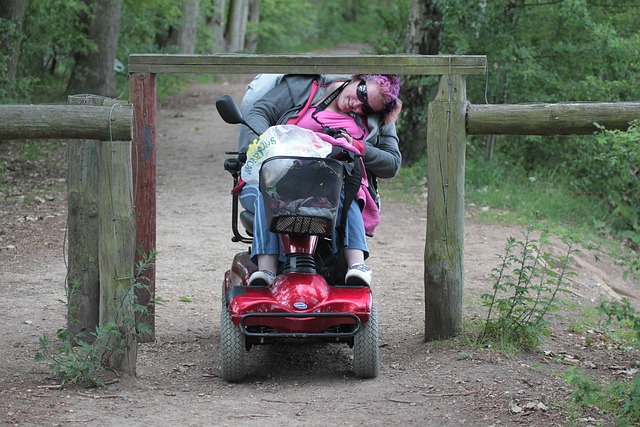In Eugene, Oregon, the demand for inclusive rideshare services goes beyond convenience, addressing social equity and accessibility needs of a diverse population. Traditional services often fail to cater to individuals with disabilities, the elderly, or those without personal vehicles. Key challenges include digital-first approaches excluding visually impaired and hearing-impaired users, and lack of physical accessibility at pick-up/drop-off locations. To bridge these gaps, collaboration among rideshare companies, local governments, and disability advocacy groups is crucial. Implementing diverse app features, fostering partnerships, and incentivizing drivers can create an inclusive transport ecosystem, enhancing quality of life and independence for all residents while enriching Eugene's vibrant culture. Successful models in Seattle and San Francisco provide a roadmap for enhancing mobility accessibility in Eugene.
“Discovering the power of movement: Exploring Inclusive Rideshare Services in Eugene, Oregon
In today’s diverse community, ensuring everyone has equal access to transportation is vital. This article delves into the growing need for inclusive rideshare services in Eugene, Oregon, addressing mobility challenges faced by individuals with disabilities and the elderly.
We examine the current landscape, highlighting accessibility gaps in the city’s ridesharing industry. By showcasing successful initiatives from similar communities, we propose strategies to foster an inclusive ecosystem, ultimately enhancing connectivity and independence for all residents of Eugene.”
- Understanding the Need for Inclusive Rideshare Services in Eugene Oregon
- Current State of Ridesharing in Eugene: Accessibility Gaps
- Benefits of Implementing Inclusive Transport Solutions
- Strategies for Creating an Inclusive Rideshare Ecosystem
- Case Studies: Successful Inclusive Transportation Initiatives in Similar Communities
Understanding the Need for Inclusive Rideshare Services in Eugene Oregon

In Eugene, Oregon, understanding the need for inclusive rideshare services goes beyond mere convenience; it’s a matter of social equity and accessibility. The city, known for its vibrant culture and diverse population, must ensure that everyone, regardless of ability or background, can enjoy equal access to transportation. Traditional rideshare services often fall short in catering to individuals with disabilities, the elderly, or those without personal vehicles. This leaves many residents stranded, limiting their opportunities for employment, education, healthcare, and social engagement.
Inclusive transport in Eugene Oregon is not just a service; it’s a right. By promoting ridesharing options that accommodate wheelchairs, offer sign language interpretation, provide clear communication channels, and cater to diverse needs, the city can foster an environment where everyone feels welcomed and included. These services are crucial for maintaining the social fabric of the community, ensuring no one is left behind in the hustle and bustle of daily life.
Current State of Ridesharing in Eugene: Accessibility Gaps

Ridesharing services have made significant inroads in Eugene, Oregon, offering a convenient and flexible transportation option for many residents and visitors alike. However, when it comes to inclusivity, there are still accessibility gaps that need addressing. The current landscape primarily caters to those with access to smartphones and internet connectivity, often overlooking the needs of individuals with disabilities or limited mobility.
In inclusive transport Eugene Oregon, ensuring everyone can access and utilize ridesharing services is a pressing issue. For example, many existing apps lack features like audio or visual assistance for the visually impaired or speech-to-text capabilities for those with hearing impairments. Additionally, physical accessibility at pick-up and drop-off points may be limited, hindering individuals using wheelchairs or other mobility aids. Overcoming these gaps requires collaboration between rideshare companies, local authorities, and disability advocacy groups to create a more inclusive environment for all residents of Eugene.
Benefits of Implementing Inclusive Transport Solutions

Implementing inclusive transport solutions in Eugene, Oregon, brings a multitude of benefits that extend far beyond mere convenience. By ensuring accessibility for all citizens, regardless of ability or age, these services foster a more connected and cohesive community. This is particularly significant in a city like Eugene, known for its vibrant culture and commitment to inclusivity. With accessible rideshare options, people with disabilities can participate fully in social, cultural, and economic activities, breaking down barriers that once isolated them.
Moreover, inclusive transport solutions contribute to improved quality of life, enhanced independence, and increased mobility for all residents. They encourage intergenerational connections as younger generations learn empathy and respect for diverse needs, while older adults retain their sense of autonomy. In terms of community development, these services can stimulate local economies by enabling individuals to access employment opportunities, education, healthcare, and leisure activities more easily, thereby enriching the social fabric of Eugene, Oregon.
Strategies for Creating an Inclusive Rideshare Ecosystem

In creating an inclusive rideshare ecosystem in Eugene, Oregon, understanding and addressing diverse needs is paramount. This involves implementing strategies that cater to individuals with disabilities, elderly residents, and those from various socio-economic backgrounds. One key approach is ensuring accessibility features within the app, such as options for wheelchair users or visual aids for the blind, facilitating easy navigation and booking.
Additionally, promoting community engagement and partnership with local organizations can foster inclusivity. Collaborating with disability advocacy groups, senior centers, and low-income community initiatives ensures services meet specific needs. Incentivizing drivers to accept a diverse range of riders through education on inclusive practices and potential bonuses can also contribute to an inclusive transport network in Eugene, ultimately enhancing the overall mobility experience for all residents.
Case Studies: Successful Inclusive Transportation Initiatives in Similar Communities

Inclusive transport initiatives have proven successful in similar communities, offering valuable insights for Eugene, Oregon. One notable example is Seattle’s accessible ride-sharing program, which has increased mobility options for people with disabilities, elderly individuals, and those with limited access to traditional transportation. The city partnered with local transit agencies and technology companies to develop a user-friendly app, allowing residents to book rides tailored to their needs. This model ensures accessibility, comfort, and independence for all users.
Additionally, San Francisco’s innovative “Micro Mobility” program has enhanced microtransit options, including accessible shuttles and electric scooters, catering to various mobility requirements. These initiatives demonstrate that inclusive transport can transform urban mobility, reduce congestion, and foster more connected communities. By adopting similar strategies, Eugene can create a comprehensive, user-centric transportation network, ensuring everyone in the community has access to safe, efficient, and convenient travel options.
